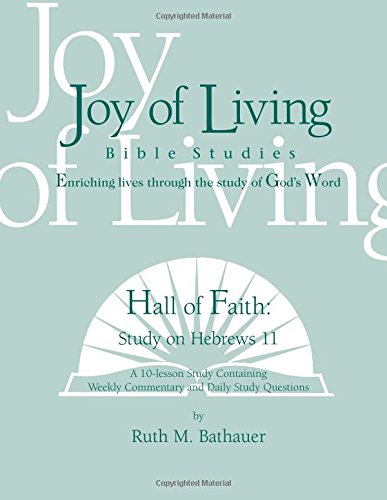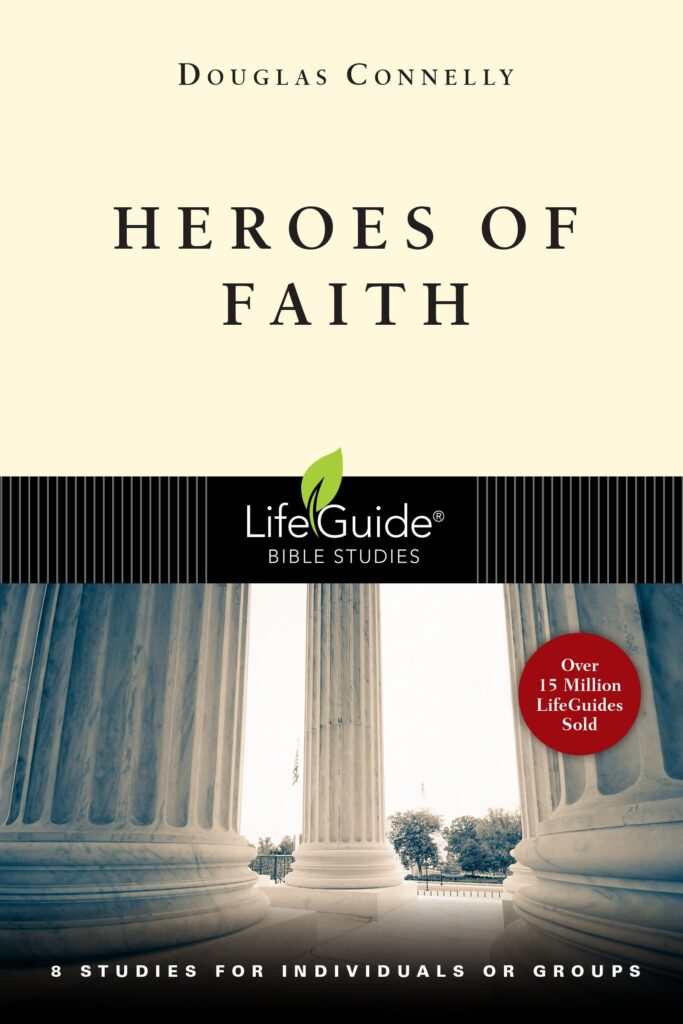Click here to return to Blog Post Intro
A Great Cloud of Witnesses: A Study of Those Who Lived by Faith by Trillia Newbell

Reverent Faith
Noah walked with God—he had an intimate relationship with the Lord. He was a righteous man. He trusted God and it showed during a time that mattered greatly. God warned Noah of an impending destruction of the earth due to the unrighteousness of that generation and all of mankind. He instructed him to build an incredibly large ark, gather his family and animals, and stay in the boat. What’s remarkable is that Moses simply records, “Noah did this; he did all that God commanded him” (Genesis 6:22).
From all accounts, Noah did not question God. He simply obeyed. There’s nothing wrong with asking questions—it’s not in opposition to loving God. But Noah’s response does reflect an awe, trust, worship, and faith that can be described as reverent fear. To do what Noah did and believe that the Lord would indeed save his family was a clear sign of faith in a sovereign and good God. We see Noah’s reverent fear as he put his faith into action and did as God commanded.
That Noah feared the Lord is evident in the way he lived in a generation devoid of godliness. Noah was spared, and according to 2 Peter 2:5, “Noah was a herald of righteousness.” A herald is one who brings good news, so Noah did not selfishly keep the news to himself. He warned his generation about the coming flood. It took great boldness, love of neighbor, and faith in the Lord to speak the truth to the people who opposed God. Noah feared the Lord more than he feared men.
Unlikely Heroes: Ordinary People with Extraordinary Faith by Daniel Lockwood

Consider the days of Noah. He lives in a world that is beyond redemption. As Genesis 6:5 put it, “The Lord saw that the wickedness of man was great in the earth, and that every intention of the thoughts of his heart was only evil continually.” Spiritual degeneration is so severe that God, with deep grief, resolves to obliterate them.
Causes of Cultural Collapse (Genesis 4-6)
Spiritual entropy marks the culture. While Cain’s descendants flourish as city-builders, they flounder as spiritual leaders, so the descendants of Cain grow wicked. Adam and Eve’s third son, Seth, becomes the hope of his people—but his descendants grow weak.
Additionally, spiritual warfare intensifies. In Genesis 6:1-5, we read puzzling references to the marriages of the sons of God with the daughters of men and learn the following:
- The sons of God are angelic beings who, spurning God’s design, marry human women in a particularly depraved example of angelic rebellion (see Jude 6-7).
- Human fathers and their daughters consent to a marriage union with angels in a misguided and arrogant effort to ensure immortality for themselves and their descendants.
- God now limits human mortality to one hundred twenty years to frustrate this wicked maneuver toward immortality.
- The Nephilim are powerful contemporary warriors. Turning to evil, they intensify the violence and wickedness on the earth during the time when the sons of God and daughters of men marry (Genesis 6:4).
Noah’s Character
In the midst of this turmoil, “Noah found favor in the eyes of the Lord” (Genesis 6:8). Little detail is given except for these pointed phrases in Genesis 6:9 –
- Noah is a righteous man (like Abel).
- Noah is blameless in his generation—a man of integrity, in stark contrast to the corruption and violence surrounding him.
- Noah walks with God (like Enoch)
Noah’s ark was huge. It would have measured 450 x 75 x 45 feet—about half the length of the Titanic. God specified that it have three decks, one door, and one window. It had ample space for thousands of animals and the stores to feed them.
Some believe the construction took 120 years because of the allusion in Genesis 6:3, but Lockwood believes it was closer to 80 years because God’s mission included Noah’s sons and daughters-in-law (Genesis 6:18). Noah’s sons were not born until 100 years before the flood (Genesis 5:32; 7:6). Adding 20 years for the sons to grow to adulthood puts the time around 80 years. But whether the task was 120 or 80 years, the stamina required to complete the work is unimaginable.
Noah, an ordained herald of righteousness (2 Peter 2:5), warned his wicked and apathetic neighbors about the impending deluge. But despite 80 years or more of preaching, not a single soul responds to the invitation. Not one conversion.
Creation asks, “Is your view of God large enough?” Abel asks, “Is your faith in God strong enough?” Enoch asks, “Is your faith in God steady enough?” Noah asks, “Is your faith in God distinct enough?”
Joy of Living Bible Studies – Hall of Faith: Study on Hebrews 11 by Ruth M. Bathauer

In her book What the Bible is All About, Henrietta C. Mears points out an important truth when she says that the account of the flood is not in the Bible because it is startling or interesting. It is there as an incident in the history of redemption taught in God’s Word. Dr. Mears further points out that the ark was a place of refuge for Noah, to save him and his family from the catastrophe of the flood and is a perfect picture of Christ—our “ark” of safety.
There was no way that Noah and his family could have been saved from destruction except by following God’s plan for their salvation and building the ark to the precise dimensions of God’s design. God is the author of salvation.
“On the seventeenth day of the seventh month” according to Genesis 8:4, the ark came to rest on the mountains of Ararat, but Noah had to wait for the floodwaters to completely recede and the earth to dry out. If you compare Genesis 7:11 to Genesis 8:13-14, it appears that Noah was in the ark for about a year. After this long period of time, God gave the command to come out of the ark; and the family stepped out onto a clean earth ready for a new beginning.
After the ark was emptied of all its inhabitants, Noah expressed his deep gratitude and thanksgiving for God’s mercy. In sincere worship, he built an altar and offered sacrifices to God. God then made a covenant, or promise, never again to destroy the earth by a flood. From that day onward, the sign of this covenant—the rainbow—took on a new meaning for all mankind as a visible reminder of our heavenly Father’s love, mercy, and grace.
Noah displayed many aspects of faith that we need to take seriously and apply to our own lives. To summarize, Noah knew God personally, and his life modeled his belief—not only to his family, but to others as he walked with God (Genesis 6:9). By faith, he paid strict attention to God’s commands and obeyed even when he did not fully understand. And because of his obedience he and his family were saved from destruction.
After examining the account of Noah’s faith, we might describe a faith life as one in which we live according to what we actually believe God says. We want to be like Noah, who demonstrated his faith in God in every phase of his daily life.
Heroes of Faith by Douglas Connelly

Catastrophe movies are big business. Oceans rise to swallow cities, pandemics wipe out nations, alien spaceships blast bridges and skyscrapers. We seat in our seats, stunned by visual effects and images of destruction and disaster, but we also realize that what we’re seeing isn’t really happening.
The Bible has its own share of catastrophes—real ones. A massive flood, for example, destroyed every human being on earth except for Noah and his family. As Noah performed the tedious, laborious work of building the ark (an act that likely took him 120 years!), all he had to rely on was God’s warning of a disaster yet to come. It’s likely that Noah had never seen a flood of any kind. Certainly, forty days of rain and an inescapable flood were things that Noah had never experienced. Clearly, his choice to believe God was not an easy one to make.
God chose Noah out of grace, “Noah found favor in the eyes of the Lord” (Genesis 6:8). And Noah responded to God’s grace by living blamelessly before God. Noah did not earn God’s favor by his good works, but his blameless life was his response to God’s grace.
Noah could have claimed that he believed God’s warning, but he would not have survived if he had not built the ark. God may call us to a task and even promise success, but we are responsible to act on the basis of our faith and do the work of preparation. Genuine faith always produces works of obedience.
Faith for Life: Inspiration from the Ordinary Heroes of Hebrews 11 by Richard Coekin

Genesis 6 tells us that the Lord saw how great human wickedness on the earth had become and that “every inclination of the thoughts of the human heart was only evil all the time” (verse 5)—except for Noah. When the Lord told Noah the astonishing news that he would send a flood to judge the people of the earth and that Noah must build a huge ark-boat (450 feet long) to save his family and rescue all kinds of animals and birds to repopulate the world, Noah believed him! And he showed it by obeying God’s building instructions.
Can you imagine how ridiculous Noah must have looked as he stopped farming and spent the family savings on timber and tools to build an enormous boat on dry land? Noah had to swim against the tide with his politically incorrect beliefs about judgment and his ludicrous behavior in building an ark. Genesis 11:7 tells us, “By faith he condemned the world,” for by accepting God’s assessment of it, Noah distanced himself from worldly self-confident corruption and invested himself in what God said would happen.
We have to do the same, swimming against the rising tide of corruption around us—being kind rather than cruel on social media, keeping our sexual activity for marriage, wrestling with our addictions to envy and shopping and attention-seeking and complaining. And by faith we need to live in Christ, who—like the ark—is the only safe place to be when the flood of God’s wrath comes upon the world to judge the living and the dead.
As Noah must have seemed ridiculous, so we can expect the mockery from the world around us. But let’s remember what Jesus said in Matthew 24:37-39:
As it was in the days of Noah, so it will be at the coming of the Son of Man. For in the days before the flood, people were eating and drinking, marrying and giving in marriage, up to the day Noah entered the ark; and they knew nothing about what would happen until the flood came and took them all away. That is how it will be at the coming of the Son of Man.
God’s Hall of Faith Speaks Today (Hebrews 11) by J. David Eshleman

Imagine working for decades constructing an ark when you’ve never experienced a rain drop. Noah stood alone for as many as 120 years. What perseverance!
It’s amazing what God can do with one person who is willing to stand alone for him. Consider God’s words to his prophet in Jeremiah 5:1, “Go up and down the streets of Jerusalem, look around and consider, search through her squares. If you can find but one person who deals honestly and seeks the truth, I will forgive this city.”
Later, God looked for a person to stand in the gap so he would not have to destroy the land. “I looked for someone among them who would build up the wall and stand before me in the gap on behalf of the land so I would not have to destroy it, but I found no one. So I will pour out my wrath on them and consume them with my fiery anger, bringing down on their own heads all they have done, declares the Sovereign Lord” (Ezekiel 22:30-31).
Noah certainly exhibited a boat load of faith!

